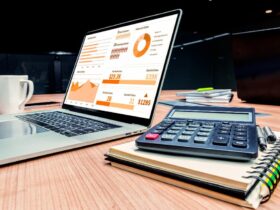For several reasons, businesses in the United States complain about money laundering, fraud, bribery, and embezzlement.
With extreme use of technology, companies’ chances of exposure to scams increase; therefore, having a forensic accountant backing up is essential. If you are interested in becoming one, this article is for you.
You can understand the roles and responsibilities of a forensic accountant, what qualifications and skills you need, and their average salary in the U.S.
Table of contents
- What is forensic accounting?
- How to become a forensic accountant?
- Necessary skills of forensic accountant
- Roles and responsibilities of a forensic accountant
- What are the career paths and opportunities for forensic accountants?
- Industries and sectors where forensic accountants are mostly in demand
- Salary for forensic accountants
- Final thoughts!
What is forensic accounting?
Forensic accounting is the general field of accounting that blends auditing, accounting, and investigatory skills. These accountants review accounting systems and processes, payments and receipts and perform actions related to criminal and legal investigations.
This field mainly examines business financial accounts and tracks money flow to comprehend a specific situation.
Now, the next question that pops in your mind is, what is a forensic accountant?
They are the professionals with the qualifications and licenses to perform forensic accounting for clients. They received specific training to investigate and gather evidence against finance-related suspicious, fraud, non-compliant and illegal activities.
A forensic accountant can also contribute to litigation cases in a company, including nonviolent financial crimes, personal injury lawsuits, insurance claims, or contract breaches.
These accountants work with accounting firms, law firms, government agencies, forensic accounting firms, and multiple corporate risk management firms.
How to become a forensic accountant?
Regardless of whom you want to work with, forensic accountants must possess a high level of proficiency and hold a bachelor’s degree or master’s degree in accounting or related fields.
Listed below are a few steps to becoming a forensic accountant in the U.S.
1. Training and education
Most employers require forensic accountants with a minimum bachelor’s degree from a renowned university accredited by the Association to Advance Collegiate Schools of Business (AACSB).
You can earn an undergraduate degree in accounting or related fields, like
- managerial accounting
- microeconomics
- macroeconomics
- business communications
- taxation
- auditing
- cost accounting
- business ethics
- principles of accounting
You can understand the forensic accounting specialization by completing elective courses in criminal investigation and fraud. Otherwise, you can also choose a minor subject like criminal justice or criminal law for basic knowledge.
2. Obtain a Certified Public Accountant Credential
Before you start working as a forensic accountant, you can first complete your Certified Public Accountant (CPA) examination conducted by the American Institute of Certified Public Accountants.
It allows you to learn financial accounting and reporting, auditing and attestations, business regulations, and more. The exam evaluates your essential knowledge and skills relevant to your field and prepares you to deal with high-level accounting work.
3. Consider an advanced degree program.
While a business owner or an agency may not ask for an advanced degree, having them gives you added benefits. You can enhance your professional abilities with a master’s degree in forensic accounting and distinguish yourself from other competitors.
Additionally, you can learn more about government regulations, tax laws, and international business practices at this level.
4. Gain experience in the field
Qualification for this role is essential, but experience speaks about your real abilities. Therefore, you can gain experience through an internship program or an entry-level position.
This experience will further help you in preparation for CPA exams and instill all the necessary skills in you to provide professional forensic accounting services.
Additionally, you can network with other CPAs or forensic accountants in your industry to gain useful advice and resources during your job search.
5. Join a forensic accounting professional organization.
While pursuing your career in forensic accounting, you can gain a competitive advantage with professional certifications. They can increase your knowledge in the industry and enhance your resume for higher earning potential and increased job security. Some of these professional certificates that you can consider are:
● Certified Fraud Examiner (CFE)
You can acquire CFE credentials from the Association of Certified Fraud Examiners (ACFE) If you can pass their exam covering four fraud-related topics.
It usually includes financial transactions and fraud schemes, investigation, law, and fraud prevention and deterrence.
● Certified Forensic Accountant (CFA)
The American Board of Forensic Accounting (ABFA) will grant you CFA credentials if you pass their exams, fulfill their prerequisites, and have two years of experience in accounting or auditing.
Necessary skills of forensic accountant
If you aim to become a forensic accountant, you need to gain a few necessary hard and soft skills. Listed below are some of these essential skills for most accountants, especially for forensic sector professionals.
Roles and responsibilities of a forensic accountant
A certified forensic accountant performs a variety of tasks using that expertise in finances and accounting. They assist in collecting data while researching funds, assets, and other financial information. Listed below are some of the duties of a forensic accountant.
● Fraudulent Bookkeeping Investigation
These individuals are responsible for collecting accounting records and assessing financial transactions to find misstatements, false reports, and unethical activities. In short, the lookout for fraudulent activities causes significant financial losses to investors from businesses and governments. They are experts in identifying, investigating, and preventing fraud and helping organizations maintain their financial integrity.
● Anti-Fraud Risk Assessment
People often search for a forensic accountant near me to help them with fraud risk assessment. You must assess their financial documents and practices to identify areas at risk of fraud. Then, consider ethics and regulations to prevent them, and advise your clients on internal financial control, response plans, and fraud prevention techniques.
● Due Diligence Contracts
A forensic accountant may need to access contracts and royalty agreements to determine areas of risk. You need to use background checks and consider ethical, legal, and regulatory factors to conduct financial investigations into all the parties involved.
● Litigation Discovery
Forensic accountants are frequently needed to support parties in legal disputes and litigations. They provide expert testimony, estimate damages, and perform financial analysis to develop compelling cases and navigate complex financial disputes.
● Insurance Claim Investigation
People hire forensic accountants to access their financial documents associated with insurance claims. They identify whether the payments made by insurance companies adhere to the terms of their policy. In order to evaluate fraudulent data and money misuse, insurance claim fraud detection uses financial statements, legal documents, and computer software.
● Mergers and acquisitions support
Forensic accountants can find hidden liabilities, determine the true value of target organizations, and spot potential financial problems during mergers and acquisitions. Their knowledge enables businesses to make wise choices and avoid costly errors during these vital transactions.
What are the career paths and opportunities for forensic accountants?
If you have a degree in accounting, numerous career parts open up for you across multiple industries within the scope of forensic analysis. However, with an undergraduate degree, you can try entry-level positions, but a graduate degree with CFE certification can take you higher.
● Entry-level positions
In your initial years, you can start your career with an entry-level role, e.g., staff accountant, financial analyst, or auditor. These positions will allow you to gain practical experience in auditing, accounting, and financial analysis under the supervision of experienced accountants.
● Gain experience
Once you gain basic experience, you can work with agencies dealing with fraud investigations or compliance-related tasks. This experience will help you develop the necessary knowledge and skills required to push your career as a forensic accountant.
● Professional certifications
Finally, if you obtain relevant certificates such as Certified Fraud Examiner or Certified Public Accountant credentials, your career aspects in forensic accounting increase. These certificates showcase your expertise and commitment to the profession and improve your chances of getting jobs with potential employers.
Industries and sectors where forensic accountants are mostly in demand
You can work as a forensic accountant in multiple Industries and sectors, as listed below.
● Government agencies
You can work with federal, state, and local agencies to investigate financial crimes, ensure compliance with regulations, and offer expert testimony during lawsuits. The most common job titles for government agencies are forensic auditor and investigative auditor. Forensic accountants can investigate National security threats by identifying the sources of financial support for criminal or terrorist groups.
● Public accounting firms
Forensic accountants are in high demand in public accounting firms seeking fraud investigation, litigation support, and regulatory compliance services. You can work as a forensic accounting specialist in both contractual and permanent roles.
● Law enforcement
Some accountants work with law enforcement agencies like the Federal Bureau of Investigations to assist in investigating financial disputes and white-collar offenses.
● Financial institutions
Certain financial institutions, like banks, insurance companies, etc., require the expertise of such accountants to determine and prevent fraud, risk assessment, and ensure regulatory compliance.
● Corporations
Large corporations hire forensic accountants to strengthen their internal controls, access potential fraud, and support litigation offenses.
● Non-profit organizations
You can also work with non-profits and charitable organizations to ensure proper financial management, maintain donor trust, and help organizations comply with regulatory and legal requirements.
● Consulting firms
Furthermore, forensic accountants can work with consulting firms to provide multiple forensic accounting services on a contractual basis.
Salary for forensic accountants
There is no particular forensic accountant salary data available from the U.S. Bureau of Labor Statistics (BLS). However, they count these professionals in its general “accountants and auditors” category.
According to recent research, the accountants and auditors earned a median compensation of over $77,000 per year and a high-end salary of $144,750 per year, with a forecasted 7% shift in employment from 2020 to 2030.
Senior professionals in the fields, like Partners at accounting firms, make significantly more.
Like other kinds of accountants, forensic accountants are in high demand across the nation.
Final thoughts!
The Bureau of Labor Statistics (BLS) predicts that the number of new jobs in the accounting sector will increase by about 6%. The government organization also points out that the employment rate of accountants and auditors is closely related to economic expansion. Therefore, they are hiring more of these professionals to examine and review financial records.
Hence, it’s high time for individuals willing to take up a career in forensic accounting. You can start with a degree in finance and accounting, get CPA credentials, earn certificates like CFA or CFE, and kick-start your career.






